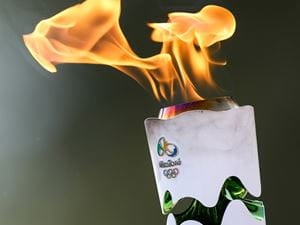
Ververidis Vasilis / Shutterstock.com
There are people today who claim that sports have taken on an oddly religious quality. Sports super-fans display many of the same qualities as religious zealots, and many people watch Monday night football more consistently than they attend church on Sundays. Nowhere, however, is this pseudo-religion more on display than during the Olympics. The nearly spiritual sense that permeates the Games today irks some people. They claim that the Olympics are a secular spectacle and that the nearly religious quality of the games interferes with the spirit of sportsmanship and competition that is so central to the Games. The presence of a spiritual component to the Olympics, however, is not a new addition like those irked by the rising religious element of the Games like to pretend. Instead, the growth of a spiritual feeling in the Olympics is a return to the original Games of Ancient Greece.
The first Olympics is believed to have been held in 776 B.C. in Ancient Greece. During this first competition, the only event was a footrace of roughly 200 meters. Every four years after that, the Ancient Greeks would gather in Olympia to honor Zeus, the king of the gods. The ancient equivalent of the opening ceremonies involved a procession of the Olympian competitors to the village of Piera. There, priests sacrificed a pig to Zeus, and the athletes were purified. Once this was complete, the priests made a second sacrifice to the statue of Zeus in the temple in Olympia. The Olympians pledged their allegiance to Zeus and the Greek gods. After this, the Games could officially begin.
The religious element of the Games was not confined to the opening ceremonies. Olympians felt that everything from their training to their performance in the Games honored the gods. As is done today, Olympic training was intensive and athletes practiced year round. Competition was even fiercer than in the modern Games, and more than a medal was on the line. Olympic victors received front-row seats at later games, money and slaves. More importantly, however, was the religious connotation of an Olympic win. Victory was seen as a sign of the gods’ favor, and winners were believed to have been touched by divinity and raised above the status of a mere mortal.
Competing in the Olympics, however, could come at a steep price. Over the centuries, more and more sports were added to the Games. Some of these events were so vicious and dangerous that losing the Games could cost an athlete their life. The chariot race was one of the most popular Olympic competitions, but it routinely ended with at least one competitor dead. The Pankration was similarly violent. This event was a ferocious brawl that was no holds-barred. Anything went in this event as two infamous Olympians gained victory through breaking their opponent’s fingers or disemboweling the other competitor.
Such violence did not stop the festive air of the early Olympics. On the third day of the Games, the Olympic feast took place. Priests brought glowing embers from the fire of Hestia, goddess of the hearth, and carried these sacred coals past the Olympic spectators while singing hymns to Zeus. When the priests reached Zeus’s temple, they lit the fire on the altar and sacrificed healthy bulls. The meat from these animals became the famous Olympic feast.
These festivities, however, came to a sudden stop when the Christian Roman Emperor Theodosius decided to put an end to traditional Roman paganism. Theodosius’s decrees outlawed nearly every aspect of Roman paganism. Soothsayers were put to death, the Vestal Virgins were forced out of their temple and Christians destroyed the Serapeum in 391 A.D. He also ended the ancient Olympic Games and their pagan focus. The last ancient Games were held in 393 A.D.
The Games gained new life almost exactly 1,500 years later in 1896. Though the host country varies today, the first modern Olympics were held in the country where it all began, Greece. The 1896 Athens Games involved 241 men from 14 nations. There were 43 events. Since these Games, the number of countries, athletes and events has increased by over an order of magnitude. When the Summer Games returned to Athens in 2004, there were 10,625 athletes of both genders from 201 nations who competed in 301 events.
The modern Olympics were said to be secular, but today there is still an underlying element of faith. Many athletes have espoused their faith after winning an event. Exhausted but elated exclamations of “Glory to God!” make their way onto TV screens every year. Numerous Olympians have also begun, unconsciously, channeling the spirit of the ancient Games. More than one Olympian has been quoted as saying that they feel their training, competition and victory honors or pleases God. No one, as of yet, has competed in the name of Zeus, but the religious spirit of the Games is slowly making a comeback.
Hymns have also found their way back into the modern Games. The hymn is not dedicated to a specific deity, but it does channel the sense of faith that would have permeated the original Games. “Immortal spirit of antiquity,/Father of the true, beautiful and good,/Descend, appear, shed over us thy light/Upon this ground and under this sky/Which has first witnessed thy unperishable fame./Give life and animation to those noble games!/Throw wreaths of fadeless flowers to the victors/In the race and in strife!/Create in our breasts, hearts of steel!/Shine in a roseate hue and form a vast temple/To which all nations throng to adore thee,/Oh immortal spirit of antiquity.”
The beginning and the end of the ancient Olympics were rooted in faith, and while the modern Olympics were meant to be secular, faith has found its way back into the Games. As the Olympic flag is raised over these upcoming Games, Olympians will once again compete for gold medals as a way to win honor for their country and, in some cases, honor God by displaying the skills He gave them for the world to see.

